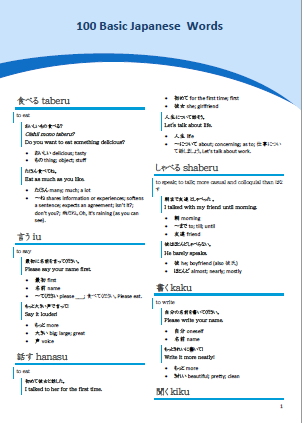22 May 2020
Japanese Insults 101
(This article was reviewed and edited by native Japanese speakers to ensure accuracy.)
Insults can be one of the fun and interesting aspects of language learning. Once you begin to understand how insults work in a language it can also feel like you’re getting to know the culture and the people.
It should be no surprise that as Japanese is a relatively polite language, its insults are also a reflection of the culture. From the standards of other languages, Japanese insults are often much milder. Breaking social conventions is more important than the exact words that are used. Not using respectful language when you are supposed to, can be very insulting in Japan.
Basic Insult Words:
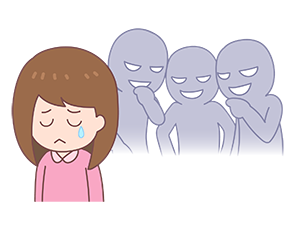
These are some basic words that may be used as insults.
One thing to keep in mind is that many of these words are considered childish, and are not taken too seriously in some situations. You may hear adults saying these words if they are in a serious fight.
That being said, it could be considered rude to use them so it’s best to be careful!
バカ (also 馬鹿) – Baka
This is one of the most basic insults and means “stupid”. It can be used for people and situations.
There are many uses and can range in meaning from a sign of concern, an angry insult, or a childish way to taunt someone.
When using towards a person, you can simply call the other person バカ. It’s also common to end the sentence with it.
割り込むなよ、バカ!
Warikomuna yo, baka!
Don’t cut in front, stupid!
よそ見してんじゃねえよ、バカ!
Yosomi shite n janee yo, baka!
Pay attention, stupid!
However, there are also a few ways to say it towards someone in a light-hearted way or with a sign of care.
If someone close to you talks about something they did that was a bit dumb, it’s possible to say the following phrases. In order to keep things fairly light-hearted, the other person must be of a lower status (ex. parent to child), younger or very close. It’s also important to keep the tone calm and not aggressive or angry.
バカじゃないの?
Baka ja nai no?
Are you stupid?
バカだな。
Baka da na.
You must be stupid.
Among children, this way of saying バカ might be common if they get in a small fight with each other:
けんたのバカ!
Kenta no baka!
Stupid Kenta!
The following two phrases with バカ can be used situationally. In a stupid situation you can talk about it with these phrases:
吹替版のアニメなんて馬鹿らしい。
Fukikaeban no anime nante bakarashii.
The dubbed version of the anime is so stupid.
そんなバカバカしいアニメまだ見てるの?
Sonna bakabakashii anime mada miteru no?
You’re still watching that stupid anime?
It’s also possible to comment on yourself, if you did something stupid. Here are a few ways:
私、バカみたい。
Watashi, baka mitai.
I feel stupid.
バカやっちゃった。
Baka yacchatta.
Oops, I did something stupid.
When actually angry and as an actual insult, バカ can also be used. However, it is mostly about the tone of the person saying it that would make the insult stronger.
バカ!
Baka!
Stupid!
The following two ways of saying バカ are probably more common in anime.
バカやろう!
Baka yarou!
You dummy!
バカもん!
Baka mon!
You dummy!
Another common バカ phrase that may appear in a certain anime is:


あんたバカ?
Anta baka?
Are you stupid?
Finally, there are a few other ways in which バカ can be used outside of simply meaning “stupid”.
バカにできない
Baka ni dekinai
It can’t be underestimated
親バカ
Oya baka
A parent who is stupidly overprotective of their child.
アホ – Aho
This word also means “stupid” and is more commonly used in the Kansai area, to replace バカ. It is basically the same as バカ but with a slightly softer nuance.
アホやな。
Aho yana.
That’s/You’re stupid.
アホくさ。
Aho kusa.
That’s stupid.
アホちゃう?
Aho chau?
Isn’t that/Are you stupid?
It’s also possible to simply call people アホ. Like バカ, it often appears at the ends of sentences.
割り込むなよ、アホ!
Warikomuna yo, aho!
Don’t cut in front, stupid!
よそ見してんじゃねえよ、アホ!
Yosomi shitenjanee yo, aho!
Pay attention, stupid!
クズ- Kuzu and カス- Kasu
These two words mean something like “worthless” and can be used toward another person to degrade them. It implies that the other person is less than human, garbage, or not worthy of respect.
クズやろう!
Kuzu yarou!
You piece of garbage!
このカス!
Kono kasu!
You scum!
くそ – Kuso
This is probably the closest insult that means “shit” in Japanese. However, it’s not as strong as the word “shit”. It can be used towards someone or when expressing disappointment.
くそ!負けた!
Kuso! Maketa!
Shit! I lost!
くそやろう!
Kuso yarou!
Piece of shit!
コラ – Kora
コラ is an interjection like “hey!” and has no specific meaning. It’s usually used to scold someone, as a way to call someone out, or when someone has wronged you.
It is not actually an insult, but it frequently appears together with insulting phrases. This can be added to the beginning or ends of phrases.
コラ!勝手に触るな!
Kora! Katte ni sawaruna!
Hey! Don’t you dare touch that!
何見てんじゃ、コラ!
Nani mitenja, kora!
Hey! What’re you looking at?
ふざけんなよ、コラ!
Fuzakenna yo, kora!
Hey! Don’t play around with me.
Annoyance Insults:
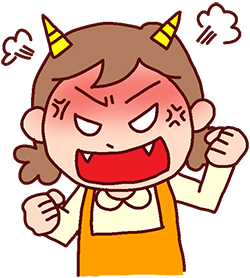

The following words can be used to express annoyance towards another person. It’s more common to hear these said by younger people. For example, an angsty teenager towards their parents might say some of these.
うるせぇ- Urusee
うるせぇ comes from うるさい which means “noisy”. However, when used in an angrier context it can turn into more of an insult like “shut up”.
うるせぇ!
Urusee!
Shut up!
うるせーなー!
Urusee naa!
Shut up (you are too noisy)!
お前ら、うるせぇぞ!
Omaera, urusee zo!
You guys, shut up!
うっせーんだよ!
Ussee n da yo!
Shut up! (this is more insisting)
だまれ – Damare
This is the command form of だまる, which means “to shut up”. It is probably the closest word to “shut up” in the English context.
だまれ!
Damare!
Shut up!
お前ら、ちょっとだまれよ。
Omaera, chotto damare yo.
You guys, shut up!
だまれ、バカ!
Damare, baka!
Shut up, stupid!
キモい – Kimoi
キモい comes from the shortened form of 気持ち悪い、which means “to feel sick” or “disgusting”. When used towards another person, it means you think the other person is gross, disgusting, or creepy.
お前、キモいんだけど。
Omae, kimoi n dakedo.
You’re gross.
あのおやじキモくない?
Ano oyaji kimokunai?
Isn’t that man creepy?
うざい – Uzai
This word is also a shortened form of a word, うざったい. It means “annoying” or “bothersome” and can be used towards other people.
お前うざいから消えろ。
Omae uzai kara kiero.
You’re annoying, go away.
あのジジイうざくね?
Ano jijii uzakune?
Isn’t that old man annoying?
Appearance Insults:


Just as in English, there are words that can be insulting based on appearance. Keep in mind that some of these words could be highly offensive and discriminatory if said to the wrong person.
ちび – Chibi – “Shorty”
だまれ、ちび!
Damare, chibi!
Shut up, shorty!
はげ- Hage – “Baldy”
うるさいんだよ、はげ!
Urusai n da yo, hage!
Shut up, baldy!
ブス- Busu – “Ugly”
キモいんだよ、ブス!
Kimoi n da yo, busu!
You’re gross, ugly!
デブ – Debu – “Fatty”
調子のってんじゃねーよ、デブ!
Choushi notte n janee yo, debu!
Don’t get cocky, fatty!
ババー – Babaa and ジジー – Jijii
These are the rude versions of the word for grandma and grandpa. Normally, we would say おばあさん (obaasan) おばあちゃん (obaachan), おじいさん (ojiisan), おじいちゃん (ojiichan). Even if the other person is not that old, it can be an insulting way to call someone.
ジジー、おせーよ!
Jijii, osee yo!
You old man, you’re so slow!
金返せよ、ババー!
Kane kaese yo, babaa!
Give me back the money, you old woman!
Appearance Insults towards yourself:
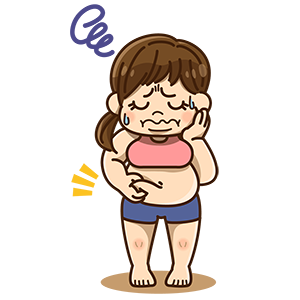

These insults are also sometimes used when talking about yourself to describe your own appearance.
デブになりたくないけどケーキ食べたい。
Debu ni naritakunai kedo keeki tabetai.
I don’t want to be a fatty, but I want to eat cake.
どうしよう、最近はげてきた。
Doushiyou, saikin hagetekita.
Oh no, I’m recently losing hair.
俺、ちびだけどバレーしたいんだ。
Ore, chibi dakedo baree shitai n da.
I’m short but I want to do volleyball.
Internet Insults
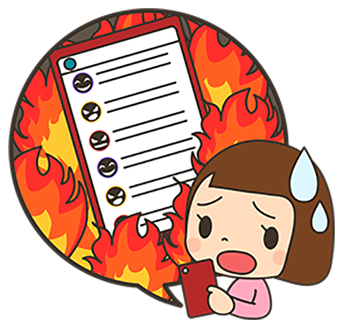

With the rise of social media, there are also insults that have popped up online. Keep a look out for some of these next time you’re reading some Japanese comment boards!
基地外 – Kichigai
Sometimes shortened to 基地 (kichi), it is a play on words and stands for 気違い(kichigai) which means a “crazy person”. To be more playful on the internet, they use a different kanji and the literal meaning of these kanji is “outside the fort”.
日本語でおk- Nihongo de ok
This can be used as an insult towards someone that makes no sense. It means “please use Japanese” as it can’t be understood. The reason why there is a “k” instead of hiragana is because when typing out “ok” in Japanese, the k remains in the Latin alphabet.
にわか – Niwaka
This is very common on the internet, especially in the anime community, and means something like “noob” or “newbie.” It’s used towards someone that doesn’t know much but suddenly appears to be knowledgeable about something.
For example, にわかファン (Niwaka fan) is a fan that became one recently and was not a die-hard fan from the beginning.
厨房 – Chuubou
This means 中坊 or “middle school boy” but it is using the kanji letters that mean “kitchen” to be playful. It is used towards someone who is immature.
DQN – Dokyun
This stands for “dokyun” and means someone that is unintellectual and has no common sense. It first appeared in a TV show title between 1994- 2002 目撃!ドキュン (Mokugeki Dokyun).
BBA/GGI – Babaa/Jijii
These two abbreviations appear frequently in social media. BBA stands for ババー and GGI stands for ジジー. As explained previously regarding ババー and ジジー it can be a rude and insulting way to call someone a grandpa or grandma regardless of age.
“You” as an Insult
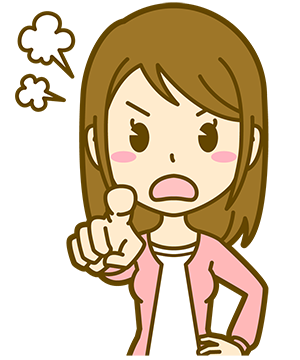

Besides insult words that might describe someone, it can also be insulting to change the word “you” into something more informal and rude. By using these words, it can change the hierarchy of the speech so that the other person is of lower status. Here are several ways in which “you” can be said in an offensive way:
あんた – Anta
This word comes from a variation of あなた and it is not inherently rude. However, it is definitely an informal way of speech which should only be used towards someone equal or lower in status than you. In that sense, when used out of this context it immediately becomes insulting.
あんた分かってんの?
Anta wakatten no?
Do you not understand?
おまえ – Omae
おまえ can also be tricky because in some situations it is not insulting. It’s usually used with people who might be close friends or where the other person is of a lower status. At the same time, it inherently sounds rough and masculine, so not everybody uses this word. It can be rude even with close friends.
In English, it might be like the word “bro” or “dude”. However, outside of established social norms, it can easily come across as talking down to someone.
何してんの、おまえ?
Nani shite n no, omae?
What are you doing?
てめえ – Temee
Compared to the other two words, this one is the rudest and insulting way of saying “you”. That being said, it’s usually used quite frequently in anime. That’s because anime can be an exaggerated version of real life. In everyday situations, てめえ would likely be heard only in very heated and angry circumstances.
Unlike おまえ, people don’t usually use てめえ unless they want to sound insulting.
てめえが悪いんだよ!
Temee ga waruinda yo!
You’re the one that’s wrong!
やろう – Yarou
This word does not entirely mean “you” but is often used with other offensive words towards a person to mean something like “bastard”. When used as a “you” it can be used with この or “this”.
このやろう!
Kono yarou!
You bastard!
It can also be used to talk about someone that annoyed you. In that case, it would attach with あの or “that”.
あのやろう、逃げやがった。
Ano yarou, nige yagatta.
That bastard ran away.
Phrases
In addition to the various words that can be insulting, the following are some common phrases that might be heard during a fight.
ふざけんなよ。
Fuzakenna yo.
Don’t play around with me.
調子にのってんじゃねえぞ。
Choushi ni notten n ja nee zo.
Don’t get cocky.
しばくぞ、コラ。
Shibaku zo, kora.
Hey! I’m gonna hit you.
死ね。
Shine.
Die.
頭おかしいんじゃないの?
Atama okashii n janai no?
Are you crazy?
Other Aspects of Japanese Insults


In general, you might notice that the insult words and phrases don’t have as strong of a meaning as insults in English. For this reason, there are actually more ways that the Japanese language can become rude or insulting, aside from the specific insults.
Breaking Social Conventions
Social conventions are an important part of Japanese culture. There are unsaid rules that people follow relating to hierarchy and social status.
From a young age, Japanese people are taught to respect elders, those who are of higher status in their social/work/school circles, among others. In all of these interactions, there are varying degrees of politeness, which are reflected even in the grammar.
Here is a glimpse into how Japanese social conventions work:
Assuming you are working for a traditional, large Japanese company, if you were talking to the CEO of your company, you would need to be extremely polite by using the appropriate honorific titles and forms of speech. However, if you were talking to a co-worker who joined the company one year before you, it’s important to be polite but not to the extent of talking to the CEO.
How does that relate to insults?
Because most people follow these rules, it is shocking and considered rude if broken. For example, if you’re in your twenties and called a middle-aged man on the street ジジー (rude way to say grandpa) it would be an insult.
In a normal situation, the middle-aged man is of higher status because they are a stranger and older than you.
No Keigo
When being insulting, keigo or the polite form of grammar, is often dropped. This goes with breaking social conventions.
Among adults, talking to strangers who are not considerably younger than you without using keigo can already be insulting in many situations.
Similarly to how there is a polite form, there is also a ruder form of talking. This kind of speech would use only informal language, and possibly command form verbs like 死ね (die), だまれ (shut-up), 言え (say), 来い (come).
Calling people without honorifics
With the dropping of keigo, it can also be insulting to use no honorifics such as さん (san).
In Japanese society, it is not uncommon to at least use some form of honorific even with close friends. Although in some cases, it’s completely acceptable to call somebody without honorifics.
By dropping honorifics completely, it can be very rude and insulting as it also puts the other person at a lower status than you. Also, the insulting words for “you” can be used like おまえ or てめえ instead of the person’s name.
Not common to use insulting language
In English, it might be more accepted to use some insulting words as part of daily life to express yourself.
However, in Japanese, it is not usual to use that much insulting language. This is partly because breaking social conventions can already be quite offensive. The way you speak often matters more than the exact words you use. It can sound over-the-top or comical if insults are not used in the right context.
As many of these insults and phrases are commonly used by anime characters, it’s important to understand that anime can be an exaggerated version of reality. Be careful about actually using any of these insulting words or phrases and it’s best to observe how native speakers are using them first.
